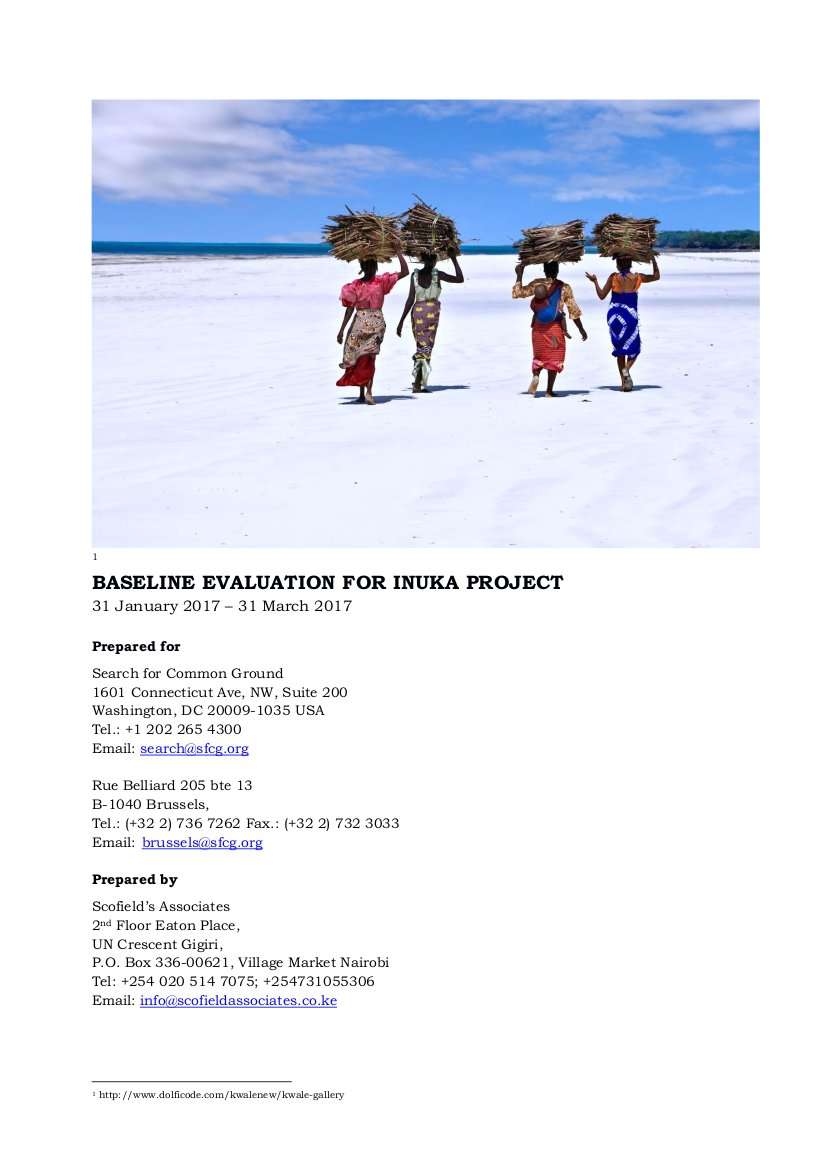
Inuka Project Baseline Evaluation.
Reports
April 01, 2017
Research overview
This is a baseline for the “Community Led Security Approaches to Violent Extremism (Inuka!)” project. The “Inuka!” project was implemented by Search for Common Ground (SFCG) in Kwale, Kilifi, Lamu and Mombasa. Here is a summary of the findings.
Findings
- Contextual analysis: Violent extremism is still significant at the coast because of the continuing inhumane treatment by police (unlawful and arbitrary arrests, kidnapping and forced disappearances, torture and extrajudicial killings). Additionally, structural and economic developments like road construction and tourism in the coastal areas have had both positive and negative impacts on VE. The former has usually led to the destruction of people’s property and livelihoods, while the latter has created more jobs but mostly for non-locals, creating resentment among locals. It creates conflicts and influences the push factors to VE.
- Existing initiatives and actors to counter violent extremism: The police, policymakers, youth, religious leaders, CSOs/CBOs and the international community are some key actors working to counter violent extremism in these communities.
- Capacity to deal with violent extremism: Issues related to VE are rarely discussed individually and when they are, are considered highly sensitive and shrouded in secrecy. The community engages with issues of security usually through the village elders and religious leaders, while communal conflict resolution mechanisms and provincial administration teams at the county level also play a crucial role.
Recommendations
With regard to activities led by CSO partners in the communities:
- Expand initiatives like ‘security and peace commitment’ for new residents, which have proven successful in Ziwani in Mombasa and Mpeketoni, in Lamu county; as part of the security monitoring process led by the communities.
- Involve youth and women from the targeted communities as implementers of peace processes not only to create jobs and financial benefit but to create a sense of ownership. This is through organising for avenues where they can suggest solutions to the problems facing them.
- Facilitate socialisation forums between the police and community; to train the police on better approaches to enhance the community-police relationship.
- Integrate and coordinate the NGOs, CBOs and CSOs that are engaged in CVE. In addition to KMYA and MUHURI, organisations like the International Migration Organisation (IMO) and Red Cross are present at the grassroots level. Thus, it will be of strategic importance to partner with those organisations in their respective capacities while also using them as entry points to the community.
- Work with small and existing initiatives as entry points when engaging with the community. As an example, there are Nyumba Kumi initiatives that seem to be working in Mpeketoni and Ziwani in Lamu and Mombasa county, respectively.
- Inuka can work with these initiatives to strengthen them beyond the specific wards to the neighbouring areas.
With regard to engaging the Government of Kenya:
- Partnership with the police and security arm of the GoK should take into consideration the need to train the police force on respect for human rights to reduce VE consequences of brutality, victimisation and profiling, to foster friendly community-police relationships that improve information and intelligence sharing, thereby reducing and preventing VE.
- The second phase of engagement should involve the GoK’s development offices, supporting them to strengthen equality in economic governance, promote and facilitate the involvement of women and youth in the entrepreneurial and governance sector, and address land issues which have been neglected for long.
- The project should increase partnership and collaboration between the community and all the law enforcement agencies to deal with VE. This is because, different counties where the program will be working has a representation of both the Kenya Army, administration police and the regular police.
With regard to Do No Harm considerations
- Be cognizant of the possibility that some law enforcement agencies, especially in Kwale, may sympathise with extremist organisations, specifically Al- Shabaab, and therefore exercise caution while engaging with them to avoid exposing the community to more risk.
With regard to the needs for further research
- Due to the fluid nature of conflict in the regions where the program will be implemented, simple activity specific needs analysis should be employed to ensure activities align with the realities of the changing conflict systems in the communities.
- Further research should be conducted to understand the influence of gangs on VE in Kenya’s coastal area, youth engagement as double agents in both CVE initiatives and VE, the effectiveness of community-based monitoring systems for community self-protection against VE, and sustainable means to address land-based conflicts that have a significant influence on VE in these areas.
